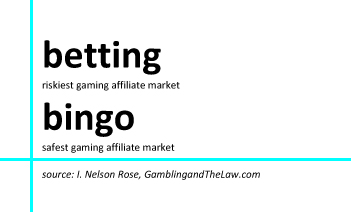Yesterday, we discussed how to redirect U.S. traffic away from your website. Today, we tackle tactics on how to legally safeproof your casino affiliate business to better protect yourself from potential penalties arising from the recent U.S. legal situation.
According to Professor I. Nelson Rose — Senior Professor at Whittier Law School and gambling advisor to a wide variety of organizations including the FBI — “the operators got themselves into this mess, by being stupid.”
He’s right, of course, and the lesson is an important one. Remember that not all operators are concerned about the regulations of the markets you may be working in.
As the Vancouver Sun emphasizes, “U.K. and Antiguan regulators do not monitor — or care about — their licensees’ activities in other countries, and the degree of regulation provided by jurisdictions such as Antigua and Kahnawake is highly questionable, to say the least.”
As in any business, risk is inevitable in affiliate marketing. But that doesn’t mean there aren’t ways to better safeproof your current business model against potential penalties.
The first problem is that the laws governing online gaming are hard to understand, and often contradictory. While it’s legal for people to spend money at online casinos and poker rooms in most major Western markets — U.S., Australia, Canada, Mexico, most EU nations, it’s not necessarily legal to advertise online casinos and poker rooms in those same countries. In addition, there are different, unrelated laws that place advertising online casinos on much different legal ground than playing at online casinos, even in the UK, where online gambling is well regulated.
Besides advertising, under one interpretation of the law, if you share a company’s revenue, then you’re guilty of any of the same crimes for which company may eventually be convicted. There’s also the risk of conspiracy.
“There are theories of criminal liability that would apply to affiliates,” Professor Rose told CasinoAffiliatePrograms.com. Under the idea of aiding and abetting, “if you knowingly help somebody commit a crime, you’re guilty of that crime.”
Experts refer to “interpretation” of these laws because there’s no actual instance of these problems ever happening. These potential penalties affiliates may face are theoretical at this point. So far, no affiliates have been included in any legal action against the online gambling industry
But that doesn’t mean such a thing won’t eventually happen. “Understand that there’s a spectrum of risk,” Professor Rose advises, particularly regarding betting affiliate marketing in the United States. He cites online bingo as the safest.
The three main points of concern for casino affiliates on this spectrum, then, would be:
• Advertising
• Revenue Sharing
• Conspiracy
Four legal safeproofing steps
Next, concerned affiliates should confront these three points of known risk by taking the following steps:
1. Stay away from organized crime — and anything that looks like it. Easy one, right? After all, most of the high-level affiliate programs here at CAP have the reputation of being backed by corporations, many of them listed on the London Stock Exchange. Still, it pays to do a little extra research into all the companies you’re currently associated with and understand them to the best of your ability.
2. Don’t market to restricted jurisdictions. As we pointed out in our review of paid advertising in the UK igaming market, each regulated country has strict laws about this. Ignore this advice and “you’re just asking for trouble,” as Professor Rose says.
3. Work only with licensed operators. Work with companies or people unlicensed in your market and your risk of accidental association with organized crime will increase.
4. Stay connected with the legal situation at websites such as the Casino Affiliate Programs blog. And, if you can, go beyond that, and seek out lawyers who know their way around these issues.
Particularly if you’re a webmaster operating on a large scale, and you’re concerned that your business crosses over into some potentially questionable areas, you’ll want to seek outside legal advice immediately to make sure you don’t put yourself — and presumably your entire career — at risk.
What’s next?
So, after reading this, perhaps you’re concerned about one or more of the operators you currently do business with. What should you do about that? We’ll deal with that question tomorrow at the CAP Blog.
